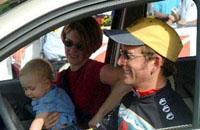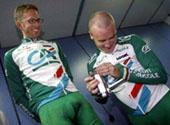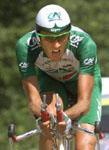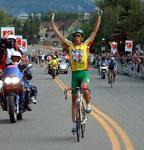
Recently on Cyclingnews.com |
An interview with Jonathan Vaughters - Part II
'V' Is For Venerable
By Anthony Tan
When you've been a professional bike rider competing at the highest level for almost a decade in Europe, it can't always be smooth sailing. To say that Jonathan Vaughters hasn't experienced his fair share of bad weather would be an understatement; Vaughters has done his time - nine years in fact - and recently has returned home to Denver, Colorado where his family, friends and ambitions now lie.
 |
In the second part of this interview with "The Professor" of the peloton, Anthony Tan speaks with Jon Vaughters about kicking off his career at the tail end of the Indurain era (and getting his tail kicked), building his reputation at the start of the Armstrong reign at US Postal, some hiccups with Credit Agricole and life after pro cycling.
The first part of the interview with Jonathan Vaughters.
Cyclingnews: Many people don't realise you've been a pro since 1994, beginning with the Santa-Clara squad. What was it like back then, starting off racing as a pro bike rider towards the tail end of the Indurain era in Europe - what were the hardest things to cope with at first?
Jonathan Vaughters: Yeah, it's funny - I started racing with Lemond in his last year - I even raced with Sean Kelly! (laughs) Even though I started racing with Santa-Clara, a small team, they had some great connections and they got us into some really good races. We did the Vuelta, we did all the top races in Spain and occasionally we'd go into France or Italy.
But we got KILLED! All the time - I mean, we were THE worst team by far! (laughs) No comparison [to the more formidable teams], but we were there, doin' all the high quality races.
CN: So was the hardest thing to cope with the speed of the racing?
“Either the racing got slower or we got faster” |
JV: Oh absolutely. And when I look back on it, I guess it could be one of the reasons why I lost some of the motivation because my first three years were such an intense struggle. I was never even remotely competitive... the only thing that I was competitive with was myself, trying to better what I had done two weeks before. I was always at the risk of getting dropped so early in the race or trying to make the time cut - it was always such a constant struggle, hanging on for dear life.
I don't how to describe it; I felt like I didn't have any control over anything or any race. I was always praying that the race would go slower a few kilometres down the road (half-laughs)... but it was immensely physically and mentally strenuous.
CN: I guess it's a touch humourous to look at your situation now in retrospect, but at the time I'm sure you couldn't find anything funny about your predicament.
JV: Well, it's funny, because it wasn't just me. Kevin [Livingston] and Bobby [Julich] started out on Motorola, which was a bigger team, but they would be in the same situation I was; I can remember one of my first Tours where it was just Bobby and I - we were the last two guys - and this is the guy that ended up coming third in the Tour de France four or five years later.
But it was always like that - Kevin and I would always be struggling, struggling, struggling, but y'know I don't know what happened over the years - either the racing got slower or we got faster. (laughs)
 |
CN: You raced with LA at US Postal for a two years beginning in 1998. How does the environment at Postal compare with the camp at Credit Agricole?
JV: Well, in all honesty, I had more fun at US Postal Service. I was only there at the beginning of Lance's reign, but it's a very motivated team; you see the work ethic of Lance, the work ethic of George and you really want to be a part of that - so you pull yourself up to their level. It's a team that you know the support is always there, and you know that if you have the condition - in any race other than the Tour de France of course - that the backup is going to be there to enable you to do really well in the race. It's a really good team for an American, and it provides an environment that let's you perform in Europe.
CN: So it was important for you to have that "local" element within the team?
JV: I never minded the foreign culture part... it's just that it's more of a team at US Postal compared with say Credit Agricole, which is a little bit more... I mean, I kinda doubt whether I'll talk to any of the riders again - maybe Jens [Voigt] or Stuart [O'Grady] - but the only guy I really had a friendship with was Chris Boardman, and he left after my first year there.
It [Credit Agricole] was a team where everyone kinda showed up, did their job and went home. I mean, the communication between the French riders and the foreign riders is really minimal and the environment to really perform was never really there. There was never a pathway saying: 'If you do this, you'll do really well'. It was Roger [Legeay, Directeur Sportif] saying: 'We've got to do well, hurry up and do well', and getting really stressed about the results not being there and not defining a clear method to follow to be enable us to do well. So it was kinda a stagnant environment - I felt like my last couple of years at there was a matter of waiting my paycheck and the end of every month, and that was the only thing that was making me turn up. (half-laughs)
CN: That really sounds very disappointing on a personal level.
JV: Well it is what it is... I didn't really have any other expectations going into that. Like I said, I hit it off right away with Chris Boardman - he was the only rider that I felt I really related to.
 |
CN: On the subject of the Tour de France, riders often speak about the Tour de France being like no other bike race. Besides the sheer numbers, what makes it so different or more difficult than say the Giro or the Vuelta?
JV: It simply is more aggressive. Riders treat one stage of the Tour de France as they would treat a Classic: it's always just flat-out, and from what I've seen from the Giro or the Vuelta, it's not always as flat-out or intense as the Tour de France. That's why you get so many crashes during the first week of the Tour. Everyone's fighting, fighting, fighting and not willing to give an inch in the peloton. And that's what separates the Tour [from the Giro or Vuelta] - the climbs generally aren't harder, longer or whatever else - it's just that there's a greater number of riders at their top condition in the race, and everyone from Lance through to the laterne rouge are nervous. So it makes for some really intense, nervous and aggressive racing.
CN: You've had great rides in other races, including winning the 1997 Route de Sud, 6th in the 2000 Criterium International and in the 2000 Paris-Nice, and probably your most-publicised win on Stage 3 of the 1999 Dauphiné Libéré, winning the queen stage to Mont Ventoux and finishing 2nd overall to Alexandre Vinokourov. It's obvious the majority of the European races don't intimidate you. Have you ruled out racing in Europe altogether at this stage?
JV: No, not at all. If I could find a smaller American team that would be interested in doing races such as the Dauphiné, the Midi-Libre or any of those races, I'd love to go back and do them. That would almost be an ideal situation; it would put me back where I was in 1998 where I was racing for US Postal Service, where we did Redlands, Philly and a lot of the US races - but we would also do races such as the Dauphiné.
Sure, it was a lot of travel [when racing for USPS], but it wasn't the 'pack up your bags January 5th and come back October 5th'. That's the part I can't handle anymore. As far as going back to Europe for a month or a six-week trip two or three times a year, that doesn't bother me at all. Mentally, it's not such a stretch, because you know that in one month, you'll be back home, and the goal would be to work towards races that I've already done well in.
And as well as trying to do well myself, I could help the younger guys learn the ropes, and that's an interesting thing for me to explore - I don't know why, but I have an interest teaching a little bit in the near future.
“I may not have been able to have been the best professional cyclist in the world but I really do think I could become the best coach.” |
CN: Do you have a preference for a team you would like to race for next year? - There must be quite a few local teams such as Prime Alliance, Navigators and Saturn with their chequebooks in waiting. Have you had any discussions with any teams at this stage?
JV: Yeah, we're just kind of watching and waiting and we'll see what happens. I've spoken with all of those teams, and something should come out of those discussions. As far as a preference goes, I don't know which one will be the best fit for me; I'll just make my best guess and go with that.
CN: Do you know roughly when you'll make a decision on your choice of team?
JV: Probably in the next three or four weeks - pretty soon I'd imagine.
CN: What about life after cycling? You're known as "The Professor" within the peloton as a result of your wealth of knowledge within the field of sports science and you mentioned you have an interest in teaching. Have you thought about coaching at all?
JV: Yeah definitely - coaching really appeals to me. I think I've got a unique combination of actually having done it and done well, as well as the intellectual and analytical capacity with my knowledge of anatomy, biochemistry, and endocrinology - and I've been able to successfully combine those two worlds.
And I don't know if that's ever been done before. You've got some top sport scientists out there who are training some big teams, but they don't really have a true feel of what of what's it like to ride a 220km race at 48 kilometres an hour. I do - and it's something that I really hope for when I make the transition out of racing to do well in. I've got big ambitions as far as training goes and like I said, with that combination, I may not have been able to have been the best professional cyclist in the world, but I really do think I could become the best coach.
 |
CN: That's really something great to aim for then.
JV: Yeah - it's a big long-term goal of mine. The only thing I don't want to become is a director [sportif], because that involves driving the car way, way too much. (laughs)
CN: On the subject of exercise physiology, how much has your knowledge benefited you over the last few years? And has it been a hindrance in any way - maybe following your exercise program too closely rather than listening to how you were feeling?
JV: No, because I've never believed in doing that. I always believed in listening to your body. Being overly-cerebral is definitely a hindrance as far as bike racing goes - I mean, I don't know why that it is, but it's just sort of a fact of life that if you're just a bit more of an instinctual person it tends to work out a little better in racing. But as far as messing up my training, I don't think so. If anything, I think my knowledge has enabled me to drag myself closer to my absolute potential than 98 percent of the guys that will ever make it [as a pro rider].
CN: Would you say that Chris Boardman fell into that overly cerebral category?
JV: Absolutely, 100 percent. But I don't think he was limited either - a lot of people thought that if only he did this or that, he would been a much better cyclist. I see it as the exact reverse - sure he had a high VO2 max [oxygen uptake] and a really aerodynamic position on the bike, which meant he could go blindingly fast in a time trial - but he sort of falls into the same scope as me. His talent in cycling was very limited, and through his knowledge in cycling, he was able to expand that to a pretty good career, in fact an excellent career for him. I got it pretty good too (laughs), so if anything, he and I are examples of people who surpassed what their bodies were really capable of in their time as cyclists.
 |
CN: Finally, we all know you've had plenty of bad luck during your time as a pro in Europe; what are some of the best memories that you will take away from your time as a pro in cycling's heartland?
JV: Oh yeah, for sure. When I won atop of Mont Ventoux, that day I realised how much I should enjoy these two or three minutes because this isn't something that happens every day - or even once in a lifetime. I still remember thinking that if I never do anything else in my entire career; it was worth it just to have done this.
And the team time trial last year's Tour de France when Credit Agricole won, that was something pretty special too. Y'know, it was an effort that was a complete surprise to everyone, and it was a real fluid effort by the entire team that day. I've got that trophy tucked back in the trophy cabinet, and I'll always remember that day as well.
On behalf of everyone at Cyclingnews, we sincerely hope everything goes well for Jonathan in his pursuits back home and no doubt he'll find a great locally-based team to ride for next year. And keep in touch JV - you've got plenty of fans out there!
